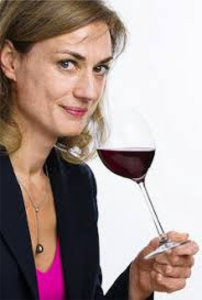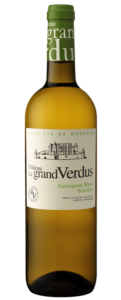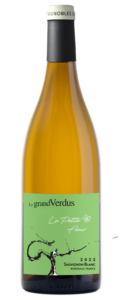Great Bordeaux at a Modest Price
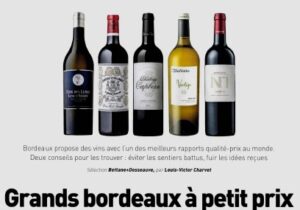 In the pages of EN MAGNUM magazine by bettane+desseauve, Louis-Victor Charvet highlights a fresh and exciting vision of Bordeaux through the work of the Le Grix de La Salle family at Château Le Grand Verdus. At the center of his article is our unique cuvée, Vertige Solera – a non-vintage white wine made from 100% Sémillon, aged for three years in concrete vats using the solera method, traditionally used in Sherry production.
In the pages of EN MAGNUM magazine by bettane+desseauve, Louis-Victor Charvet highlights a fresh and exciting vision of Bordeaux through the work of the Le Grix de La Salle family at Château Le Grand Verdus. At the center of his article is our unique cuvée, Vertige Solera – a non-vintage white wine made from 100% Sémillon, aged for three years in concrete vats using the solera method, traditionally used in Sherry production.
This distinctive white combines richness and freshness, offering a lively mineral structure and subtle oxidative notes. With its elegant complexity, Vertige Solera breaks away from Bordeaux’s traditional expectations while remaining deeply rooted in its terroir. It reflects the creative drive of brothers Thomas and Édouard, who continue to explore new approaches without losing sight of the essence of their land.
Vertige Solera is not only a wine of character – it’s the expression of a philosophy. A Bordeaux that is accessible, authentic, and forward-thinking. It embodies the spirit of quiet revolution: patient winemaking, meticulous aging, and bold identity.
Charvet’s feature in EN MAGNUM praises the vision and precision behind the cuvée, describing it as one of those rare Bordeaux wines that offers true personality, at a modest price, without compromising on quality.
Read the full article here : En Magnum
About the author:
Wine critic and writer for EN MAGNUM, Louis-Victor Charvet is part of a new generation of wine journalists: passionate, thoughtful, and deeply connected to the land. His work highlights vignerons who bring a fresh dynamic to French wine without losing integrity. His writing is both technically insightful and emotionally resonant, with a special focus on authentic terroirs and bold ideas.
Grand Verdus in M Le Monde
In M Le magazine du Monde, journalist Laure Gasparotto features two wines from Château Le Grand Verdus, showing a fresh and creative face of Bordeaux.
First, Les Petites Bulles, our blanc de noirs Pet Nat made from cabernet franc and merlot, represents the growing success of sparkling wines in red-dominated regions. With pear and apricot notes, it’s a light, charming sparkler that’s winning hearts far beyond Bordeaux.
Then, Vertige Solera, a non-vintage white made from Sémillon aged over multiple years with a slightly oxidative style. Its mineral, saline tension pairs perfectly with spring vegetables and highlights a bold, textured take on Bordeaux white wine.
Together, they offer a modern, expressive and daring vision of Bordeaux led by the Le Grix de La Salle brothers.
Read the article here: Vertige – Les Petites Bulles
About Laure Gasparotto
A journalist, wine taster, and author, Laure Gasparotto is one of the most respected voices in the wine world. A regular contributor to Le Monde and the author of several books, she offers a thoughtful and nuanced perspective on vineyards, often highlighting committed winemakers and innovative approaches in the wine industry.
Le Grand Verdus at Wine Paris | Vinexpo 2025 – Stand 7.1 G264
From February 10th to 12th, 2025, meet Château Le Grand Verdus at Wine Paris & Vinexpo, the must-attend event for wine professionals. Join us at stand 7.1 G264 to discover our wines, learn about our winemaking methods, and share a friendly moment around our passion for wine.
Our family-owned estate in Entre-Deux-Mers offers a diverse range of wines: fresh and aromatic whites, bold reds, terroir-driven selections, and exceptional cuvées. This is a unique opportunity to taste our latest creations and explore our sustainable, organic approach to winemaking.
Wine Paris & Vinexpo | Paris Expo Porte de Versailles
Book an appointment with us: chateau@legrandverdus.com
Autumn Harvest Lunch Wines to Consider from Four French Regions
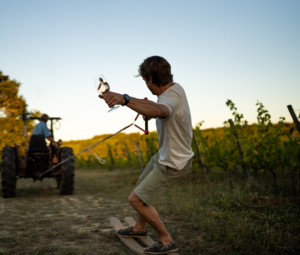 Autumn Harvest Lunch Wines to Consider from Four French Regions
Autumn Harvest Lunch Wines to Consider from Four French Regions
In an article published on Forbes.com, Tom Mullen highlights our Le Grand Verdus – Les Petites Bulles as one of the perfect wines to accompany end-of-harvest meals. This Pet Nat Blanc de Noirs (Vin de France) scored 90+ points and stands out with its light orange hue, delicate bubbles, and aromas of red cherries and shortbread. A lively and elegant wine, ideal to pair with a fruit dessert, it celebrates the artisanal spirit of Entre-Deux-Mers..
eShop : ICI
Article : ICI
Organic Selection of Bordeaux and Bordeaux Supérieur
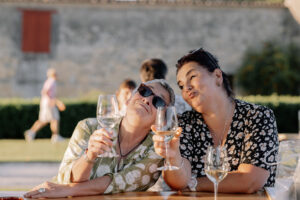 Organic Selection of Bordeaux and Bordeaux Supérieur: Le Grand Verdus Featured
Organic Selection of Bordeaux and Bordeaux Supérieur: Le Grand Verdus Featured
In Terre de Vins, Mathieu Doumenge highlights our Bordeaux Blanc 2023 organic as part of an exceptional Bordeaux selection. He praises the intensity of ripe fruit aromas, with peach and pear leading the way. The mouthfeel is fresh and lively, enhanced by a subtle mint note, finishing with a crisp, refreshing finale that beckons for another glass. A true demonstration of the Le Grix de la Salle family’s expertise.
eShop -> ICI
Article – > ICI
Wines: Why Bordeaux is Betting More and More on Whites
Wines: Why Bordeaux is Betting More and More on Whites
A fascinating article by Léa Delpont in L’Express, focusing on summer wines and featuring our Château Le Grand Verdus – Bordeaux Blanc organic 2023! As Bordeaux innovates with new plantations, the Médoc blanc AOP, and “blanc de noirs” cuvées, our wine showcases the elegance of Bordeaux whites. Crafted from a traditional blend, it highlights the freshness of Sauvignon Blanc, the richness of Sémillon, and the floral notes of Muscadelle. A proud recognition of our organic commitment and dedication to terroir.
eShop -> HERE
Article -> HERE
Spontaneous Generations
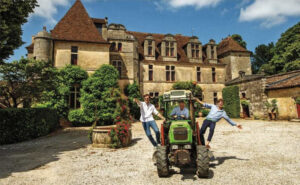 […] From Provence to Champagne, passing through Bordeaux and Languedoc, five instances of passing the torch to the younger generation.
[…] From Provence to Champagne, passing through Bordeaux and Languedoc, five instances of passing the torch to the younger generation.
Nestled in the heart of Entre-deux-Mers, just thirty minutes from Bordeaux, the Renaissance family château of Grand Verdus has known vines since 1846. However, it used to deliver its grapes to the Créon cooperative. That was until Philippe Le Grix de la Salle’s coming out. “Gripped by a passion for winemaking, our grandfather decided to make his own wine, and our father, Antoine, immediately followed suit,” recount Thomas and Edouard. Expanding the vineyard, contagion of desire, neither needed any pushing to join the family ranks. With studies in agriculture, a stint in New Zealand for Thomas, and South Africa for Edouard, they are now the driving force behind the Grand Verdus’ renown. Agroforestry, organic certification, creation of a conservatory of ancient grape varieties, and the cuvées Les Parcellaires, La Petite Folie, Les Petites Bulles… they are shaking up the codes of Bordeaux. But there is no doubt, the passion of this trio is from the same barrel! […]
Bordeaux – When balance and pleasure meets
Bordeaux – When balance and pleasure meets
A wonderful feature by Alexis Goujard in La Revue du Vin de France, celebrating our La Petite Fleur 2023! Selected as one of the world’s best wines under €20, this cuvée shines with its smooth, lively, and citrusy profile. Light and easy to enjoy, it’s the perfect Bordeaux for a casual aperitif, embodying simplicity and elegance. A proud recognition of our commitment to authenticity and respect for nature.
E-shop -> ICI
Article -> ICI
Bordeaux: A French Passion
Revue des deux mondes – Special Edition
In a recent issue of the Revue des deux mondes, Béatrice Delamotte highlights the captivating story of brothers Thomas and Édouard Le Grix de la Salle, alongside their father Antoine, owners of Château Le Grand Verdus. Their bold approach in the Bordeaux wine industry, characterized by innovative single-varietal and parcel-based cuvées, challenges established conventions. As the author explains, “The two young men have made wine abroad, confronted other cultures, and disrupted Bordeaux codes with their offbeat cuvées.”
Their strategic choice to stand out from Bordeaux’s traditional market by opting for autonomous distribution is also emphasized: “No distribution through merchants for Château Le Grand Verdus, but the claimed choice of autonomy.” This decision allowed Thomas Le Grix de la Salle to explore untapped international markets, thereby enhancing the global recognition of their family wine estate. As Béatrice Delamotte notes, “We are also present in countries like Colombia, Costa Rica, and Cambodia.”
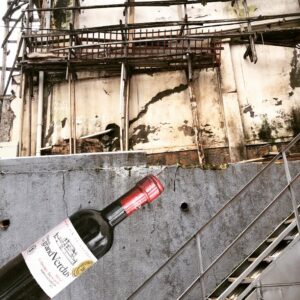 The article highlights the Le Grix de la Salle brothers’ commitment to educating consumers about the true identity of Bordeaux: “A real effort to explain what Bordeaux is when some still think it’s a grape variety…” This approach, combined with an annual production of 700,000 bottles, positions Château Le Grand Verdus as a major player in the contemporary wine landscape, where innovation and tradition harmoniously blend.
The article highlights the Le Grix de la Salle brothers’ commitment to educating consumers about the true identity of Bordeaux: “A real effort to explain what Bordeaux is when some still think it’s a grape variety…” This approach, combined with an annual production of 700,000 bottles, positions Château Le Grand Verdus as a major player in the contemporary wine landscape, where innovation and tradition harmoniously blend.
Additionally, the international impact of Château Le Grand Verdus is illustrated by murals in Kigali: “Like in Rwanda, where street art paintings display the estate’s colors in the streets of the capital, Kigali.” This artistic recognition testifies to their success in penetrating niche markets with their distinctive approach and their growing influence beyond Bordeaux’s traditional boundaries.
Vertige: Acclaimed by the Press
Dive into the universe of Cuvée Vertige from Château Le Grand Verdus, a white wine that blends tradition and innovation in Sadirac, in the Entre-deux-Mers region. As described by Sud Ouest, “On the estate with 100 hectares of vineyards, they have embarked on an unusual solera aging in Gironde.” This method, inspired by Spanish Sherries, shapes a unique wine from multiple vintages.
The specialized press unanimously praises Cuvée Vertige. According to La Vigne, it is “a surprisingly aromatic 100% Sémillon with a long finish.” La RVF adds that this wine offers “remarkable intensity but above all a lot of finesse.”
Edouard Le GriX de la Salle, co-owner of Le Grand Verdus, emphasizes the importance of time for this grape: “Sémillon is a fantastic grape variety, but it needs time,” he explains, as reported by Terre de Vins magazine.
Aging in underground concrete tanks through the solera method gives Cuvée Vertige a remarkable aromatic complexity. As mentioned by La RVF magazine, this wine “develops surprising and attractive nuances, with a perfectly integrated exotic touch.”
Available at the estate price of 19 euros, with an annual production of around 4,000 bottles, Cuvée Vertige from Château Le Grand Verdus is not only rare but also sought after for its quality. – Visit us in-store
Vertige embodies audacity and excellence in wine innovation, offering enthusiasts a unique white wine rich in history and flavors, ready to be enjoyed now or treasured for years to come.


